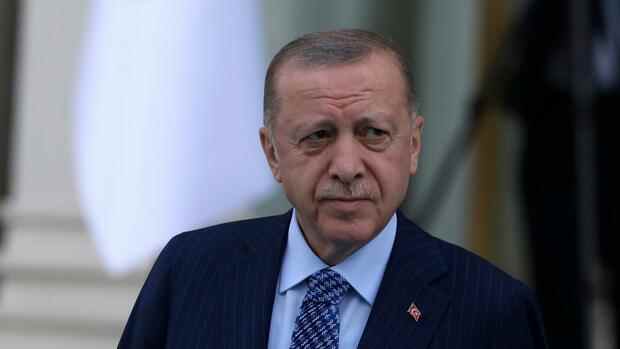Istanbul Turkish President Recep Tayyip Erdogan has repeatedly announced a new military offensive in neighboring Syria. Now Ankara seems to be making good on the threat. The aim is probably – as in similar military operations before – to push back Kurdish militias.
Turkey supports rebel groups in the Syrian civil war. Syrian President Bashar al-Assad is backed by Russia. Turkey has carried out several military offensives in northern Syria since 2016 and occupies border areas there.
In addition to fighting the terrorist militia Islamic State (IS), the main goal was to push back the Syrian Kurdish militia YPG from the border, which Ankara sees as a threat. Turkey has partially succeeded in this: the Turkish military, with the support of rebels, currently controls the area west of the Euphrates River around the towns of Afrin and Jarablus and an area east of the river between the border towns of Tal Abiad and Ras al-Ain.
Top jobs of the day
Find the best jobs now and
be notified by email.
The Syrian Democratic Forces (SDF) led by the YPG also controlled large areas on the border with Turkey. The Kurds established a self-government (Rojava) from 2012.
Turkey has carried out several military offensives in northern Syria since 2016 and occupies border areas there.
(Photo: dpa)
In the meantime, the area controlled by the Kurds on the Turkish border has shrunk: the militias currently hold the area around Kobane and the border area in the north-east. Erdogan is a thorn in the side of an autonomous Kurdish region. He fears that such a model could fuel the Kurdish minority’s desire for autonomy in Turkey.
YPG point of contention: What role does the Kurdish militia play?
Turkey equates the YPG with the banned Kurdish Workers’ Party PKK. The PKK is responsible for numerous attacks in Turkey and is also considered a terrorist organization in the USA and Europe.
Turkey is fighting the PKK not only at home but also in Iraq, where it has its headquarters. Ankara is demanding that the West also put the YPG on the terror list. However, the YPG is a close ally of the US in Syria, for example in the fight against IS. In 2014, for example, the YPG pushed back an IS attack on the Syrian-Kurdish town of Kobane.
What is Turkey up to now?
Turkey is expected to focus its offensive on the area east of the Euphrates. Pro-government media wrote, for example, that the Turkish military wanted to further push back the Kurdish militias and thus connect two areas under Turkish control.
>> Read here: The West has ignored Turkey for too long. A comment.
Erdogan has already made it clear what he intends to do: He wants to penetrate up to 30 kilometers deep into Syrian territory. The aim is what Turkey calls a “safety zone”. Erdogan accuses the YPG of attacking Turkey from Syria. The Kurdish militias deny this and accuse Turkey of “provocation” to justify an attack.
What is this zone about?
The idea is not new. During a military operation against the YPG in northern Syria in 2019, Turkey wanted to create a zone along its border from which all Kurdish militias should withdraw.
>> Read here: The NATO military alliance simply explained
From Turkey’s point of view, this approximately 30-kilometer-deep zone should extend eastwards from the Euphrates River over more than 400 kilometers to the Iraqi border. At that time, Turkey’s offensive, which was criticized internationally, was stopped by agreements with the USA and Russia. It was agreed that YPG fighters would have to withdraw from the border areas. However, it remained unclear which areas were exactly involved.
Turkey also wants to use the zone to resettle Syrians there. Around 3.7 million Syrian refugees live in Turkey. Because the mood in the country towards refugees has deteriorated significantly, Erdogan is also under domestic political pressure. He has said several times that he wants to send Syrians back – on a voluntary basis.
What does the planned military operation have to do with NATO’s northern expansion?
The YPG also plays a role in the dispute over NATO’s northern expansion. Turkey accuses Sweden of supporting the Kurdish militia. The government in Stockholm rejects this. According to experts, the decision to use the military should not be made by chance right now.
>> Read here: Sweden and Finland are to become bulwarks against Russia
Erdogan sees his chance because Russia – a key player in Syria – is tied to the war of aggression in Ukraine, says Salim Cevik from the Center for Turkish Studies (CATS) in Berlin. On the other hand, he uses his “veto card” in NATO to persuade the US to make concessions in Syria.
How are Erdogan’s planned Syria offensive and the attitude towards NATO’s northern expansion perceived domestically?
Erdogan, whose poll numbers are falling a year before the election, should also hope for some domestic political impetus. In the past, operations in Syria had always brought the president a boost in support.
The fact that the YPG and the PKK are a real threat is undisputed in large parts of Turkish society. The president should also score points with cross shots in NATO. According to a survey, almost half of the Turkish population blames the defense alliance for the war in Ukraine. His performance as a strong leader defying the West is well received by home audiences.
More: Global Economy in Crisis – The Biggest Risks and Their Consequences
